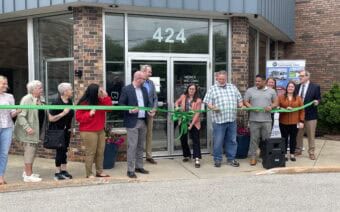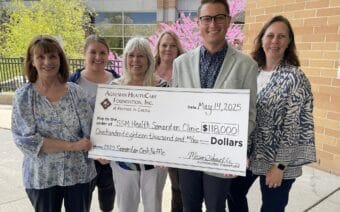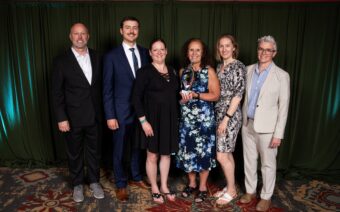
November 18, 2024
OCONTO – A new partnership between Bellin Health Nephrology and one of its Northeast Wisconsin hospitals aims to fill a need for the health system’s patients on dialysis.
“Going through kidney disease is really by no means easy at all,” Chitra Bhosekar – a board-certified nephrologist with Bellin – said. “When you’re told you’re on dialysis, it imposes a huge burden on you (and) on your family.”
In an attempt to help alleviate that burden, Bhosekar said patients are put on peritoneal dialysis (PD), allowing those suffering from kidney disease the opportunity to do dialysis from home.
Dialysis, according to the National Kidney Foundation, is a treatment that assists the body in filtering fluid and waste products from the blood when the kidneys are not able to.
According to the foundation, the difference between the two types of dialysis – PD and hemodialysis – is how waste and extra fluid are filtered.
Though hemodialysis uses an external dialyzer machine, Bhosekar said PD utilizes the lining of a patient’s abdomen as a natural filter, so the treatment types require different access ports to be surgically implanted into a patient.
As opposed to hemodialysis, Bhosekar said PD allows patients more freedom because they don’t have to travel to a facility to be hooked up to an external machine several times a week – achieving the same results at home.
“It all worked really well until they fell down, they broke a hip, or they had, say, a heart attack,” she said. “They ended up coming to the hospital and when they were ready to get discharged, if it was determined that they required some kind of a rehab facility, it suddenly came to light that there were almost no facilities in the majority of the state – about to 150-mile radius around here – that were offering that ability to our patients.”
Bhosekar said a patient in that situation would then have to alter their dialysis modality because rehab facilities weren’t accepting PD patients – forcing them to undergo further procedures to receive hemodialysis.
“The best we were able to do is to set this up at our own location,” she said. “So we were able to control the quality, we were able to control the staffing, the labor, the training – and it was needed in the community.”
In-house solutions
Bhosekar – who has been a practicing physician since 2007, joining the Bellin team four years ago – said around 2016 she was looking to specialize.
After experiencing everything that kidney disease patients had to go through – and how doctors were able to help them – while working as an internist at Froedtert, Bhosekar said she was accepted into a two-year fellowship and has been practicing nephrology ever since.
“It was an exciting time to be able to learn more about it and to be able to affect change,” she said. “It always intrigued me – the things that we were able to do to alter (a patient’s) course.”
Bhosekar said though dialysis treatment is revolutionary in treating patients with kidney problems, “I think people outside the healthcare community – even outside the field (of nephrology) – do not recognize the extent of burden that it imposes on patients.”

“They go through a lot to get to a point of being able to do their dialysis at home, just to find out that with any small issue, they may be asked to change, get more procedures (and) be put through these harrowing requests,” she said.
According to an informational document provided to The Business News by Bellin healthcare professionals, patients who used at-home PD needed to switch their type of dialysis to in-center when they were discharged from the hospital and required rehab.
Bhosekar said most rehab facilities in the area are housed within nursing homes – so “we don’t have control with what they do, how much they’re willing to spend, and how they’re willing to train their staff.”
Because of that lack of control, Bhosekar said Bellin’s PD patients were out of luck when looking for a facility that could take them on for both rehab services and their preferred dialysis modality.
“Whatever the reason for their hospitalization was,” she said, “they would actually get better and look forward to getting on with their life, just to be told that, ‘Hey, there is no rehab facility that is willing to accept you. So you now have to switch.’”
Bhosekar said Bellin saw this disconnect in care and decided to create the solution in-house.
“We at Bellin worked with one of our hospitals in Oconto (820 Arbutus Ave.) and were able to train their staff to have the ability to do peritoneal dialysis for the rehab patients who (went) there,” she said.
Now, Bhosekar said patients requiring both rehab and PD treatments no longer have to undergo additional procedures to change their modality or experience the stress of being transported to a facility to receive hemodialysis.
“This facility suddenly opens up options for our patients who come in and are ready to go into a rehab unit,” she said. “They can actually go to rehab, do what they need to do, get stronger while continuing peritoneal dialysis and then seamlessly just move home.”
Bhosekar said everyone, young and old, should be proactive with early detection for kidney problems and/or diseases.
“There are lots of new treatments in the field of getting care now,” she said. “So, it is really important that people get identified early and then they come in for treatment early.”
For more information, visit bellin.org.
 FVTC, Children’s Wisconsin partnership supports Go Baby Go in the Fox Valley
FVTC, Children’s Wisconsin partnership supports Go Baby Go in the Fox Valley 100% resilient, renewable energy healthcare campus
100% resilient, renewable energy healthcare campus








